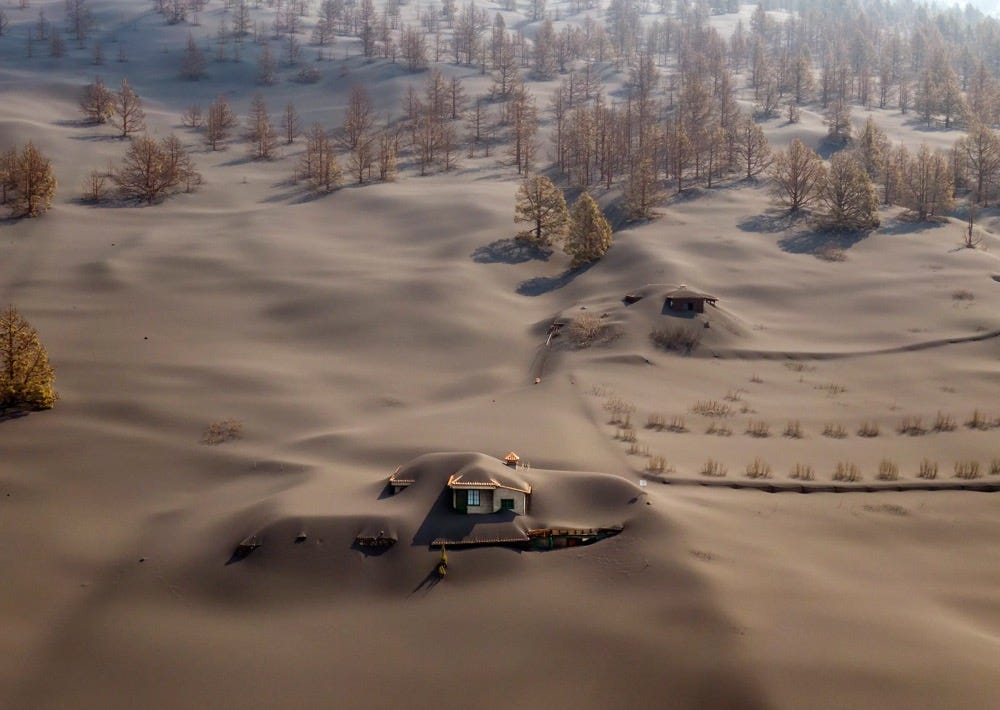Rough times in the world, slightly easier week for our producer Gabe
On balance, Gabe would be glad to take on more work if it wiped out covid but that's not being offered.
If you get something out of this newsletter or the Depresh Mode podcast, I would appreciate your financial support. Go here, pick a level that works for you, then select DEPRESH MODE from the list of shows. And thank you.
Episodes that are easier than usual for Gabe, harder than usual for me
Gabe is the producer of Depresh Mode. He’s in charge of coordinating guests, making sure that taping them goes well, matching up the voice tracks during the editing process. On shows such as this week’s episode, he doesn’t have to do all that. Because it’s just me! Talking into my microphone whilst alone in a room! Which always feels a bit weird!

And because it’s, like, 15 pages of copy, it’s more time consuming to get the thing ready than my usual intros and transitions and credits. I had six different scripts that I started and then abandoned in the course of trying to make the final script work.
This week’s show began with me asking myself what I can do in the face of the mental turmoil I see so many people dealing with. Because although I’m not a doctor or a psychologist, I am someone who hears from people a lot. I’m very in touch with the online communities that follow the show in particular. People are nervous, they’re sad, and above all they’re so very exhausted.
They’re weary from the mental toll of:
Not knowing how covid will play out from here
Constantly fearing for their lives to varying extents
Worrying about how we’re all being affected by the actions and inactions of are fellow citizens who refuse to recognize the covenant inherent in citizenry itself
Having to view everyone, even people they love very much, as a potential viral threat
I mean, when you’re always wondering if anyone might kill you accidentally or you might kill others, well, that messes with you.
It’s trauma. That’s what we’re going through.
People respond differently to it. For some, it will result in a disordered life due to post-traumatic stress. Others will just get walloped but won’t necessarily develop a diagnosable form of PTSD.
So this week’s show is about understanding what widespread complex trauma does, especially in a disaster/pandemic situation, and what it’s going to look like in our minds and bodies after the actual spiky beach ball of covid-19 is more under control.
And there’s hope! I figured it’s kiiiiiind of a service to tell people how donked up everything is but only kinda. I also include why I’m hopeful. Essentially, in terms of our collective tools to find health again and enter a phase of recovery, we’ve never been better positioned. Even in our society that celebrates ignorance and cruelty so often, there are tools and technology to connect empathetically and help each other through the troubled waters present and ahead.
Speaking of traumatic stress, the photos of the year!
The top bookmarked link on my browser is kottke.org. Has been for many years. Jason Kottke is a blogger and he kept blogging long after most everyone had walked away from their blogs in favor of platforms like Twitter that demanded less concentration and attention span.
Jason has a great rundown of various photos of the year lists and some of the photos too. Often, the photos - on his list and on the lists he links to - are upsetting. Because it was often an upsetting year:
Sometimes they’re wonderful:
And, like the year we just had, sometimes they’re straight up weird:
Dogs are good. Maybe you’d like to foster some.
Here’s some information on doing that. Dogs need love and a place to stay. Even if you’re not ready to adopt, maybe you can help them out.
Top portrayals of mental health on screen
Here’s a list by Psychiatric Times. I don’t know the publication so can’t vouch for it but the list is interesting and worth talking about.
There are some titles familiar to me, like Ted Lasso:
When the coach is not able to help pull Danny out of his depression, the team brings in a therapist who helps him move forward. After seeing the therapist’s success with Danny, many other, often macho, members of the team engage her services. They realize that by simply talking about what is on their minds, they are able to feel better and move on in their lives. Ted also reluctantly seeks her services when he has to leave the sidelines because of a panic attack during a critical match. When knowledge of Ted’s panic disorder becomes public, he challenges the media to look at the treatment of mental health in sports.
Although the show later depicts unrealistic boundary violations after the therapist suffers from a biking accident, the two agents of change, Ted Lasso and the therapist, are complementary in advancing the inner lives of the team members. Much of the success of the series is due to the viewer also being exposed to the possibility that positive change can occur with optimism, self-confidence, and good therapy.
And some that aren’t:
Shtisel gives viewers a fascinating glimpse into a world foreign to most, yet somehow simultaneously familiar. Although our day-to-day culture often either silences mental illness or sensationalizes it, Shtisel’s fictional portrayal seems to bring us closer to reality than real life. That’s good TV.
It’s no longer Christmas but it is at least winter
Not that we need an excuse to watch Kate Bush be wonderful. I’ve tried and tried to get my kids interested in Kate Bush. It hasn’t worked. Yet. But I have endurance.






